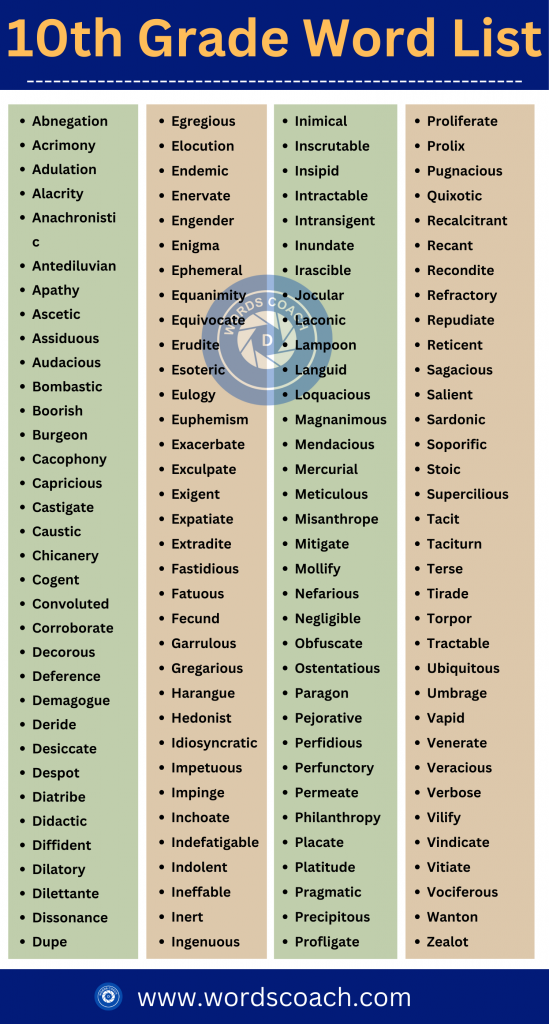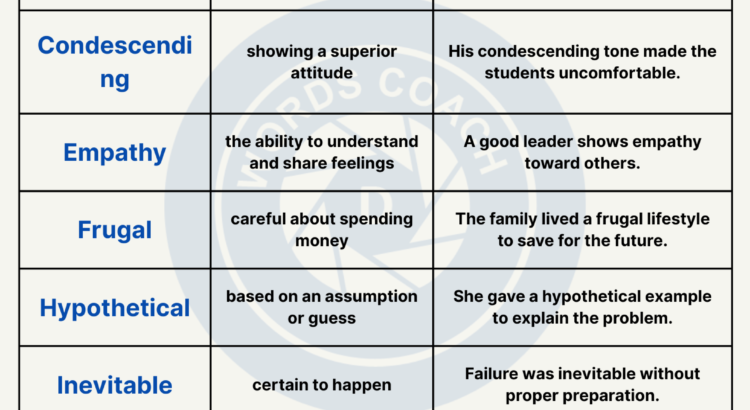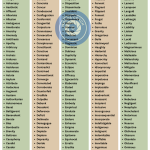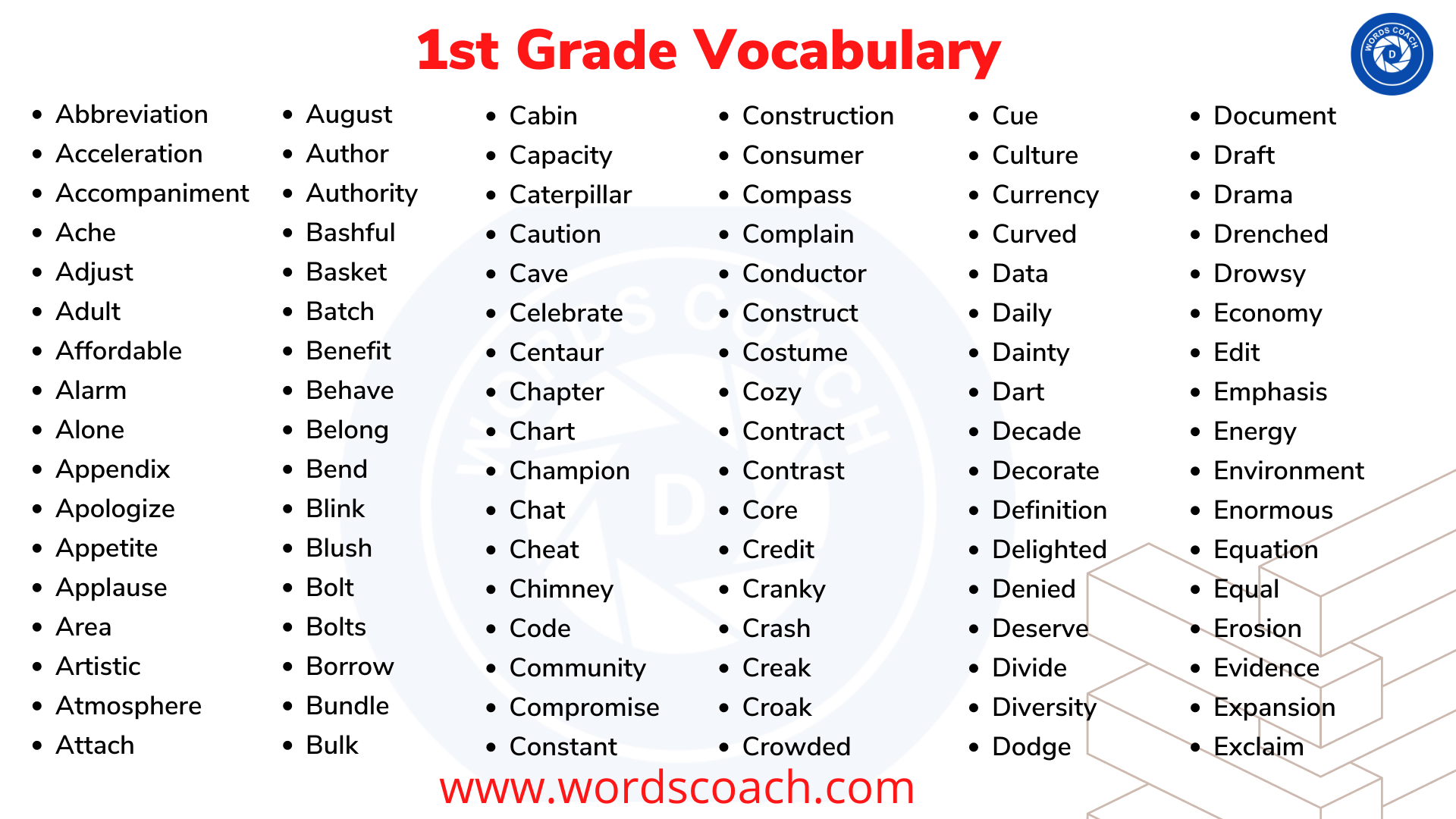10th Grade Word List
By the time students reach 10th grade, they are expected to analyze complex texts, write persuasive essays, and express themselves with clarity. A strong vocabulary is the foundation for success in academics, competitive exams, and effective communication. That’s why a 10th grade word list is essential for students who want to sharpen their reading, writing, and speaking skills.
10th Grade Word List with the meaning
| Word | Meaning |
|---|---|
| Abnegation (n.) | The act of renouncing or rejecting something; self-denial. |
| Acrimony (n.) | Bitterness or ill feeling. |
| Adulation (n.) | Excessive admiration or praise. |
| Alacrity (n.) | Brisk and cheerful readiness; eagerness. |
| Anachronistic (adj.) | Belonging to a period other than that being portrayed; out-of-date. |
| Antediluvian (adj.) | Ridiculously old-fashioned; from before the biblical flood. |
| Apathy (n.) | Lack of interest, enthusiasm, or concern. |
| Ascetic (n.) | A person who practices severe self-discipline and abstention. |
| Assiduous (adj.) | Showing great care and perseverance. |
| Audacious (adj.) | Showing a willingness to take surprisingly bold risks; disrespectful. |
| Bombastic (adj.) | High-sounding language with little meaning; inflated. |
| Boorish (adj.) | Rough and bad-mannered; coarse. |
| Burgeon (v.) | To begin to grow or increase rapidly; flourish. |
| Cacophony (n.) | A harsh, discordant mixture of sounds. |
| Capricious (adj.) | Given to sudden and unaccountable changes of mood or behavior. |
| Castigate (v.) | To reprimand (someone) severely. |
| Caustic (adj.) | Sarcastic in a scathing and bitter way. |
| Chicanery (n.) | The use of trickery to achieve a political, financial, or legal purpose. |
| Cogent (adj.) | Clear, logical, and convincing. |
| Convoluted (adj.) | Extremely complex and difficult to follow. |
| Corroborate (v.) | To confirm or give support to (a statement, theory, or finding). |
| Decorous (adj.) | In keeping with good taste and propriety; polite and restrained. |
| Deference (n.) | Humble submission and respect. |
| Demagogue (n.) | A political leader who seeks support by appealing to popular desires and prejudices. |
| Deride (v.) | To express contempt for; ridicule. |
| Desiccate (v.) | To remove the moisture from (something); to drain of energy or vitality. |
| Despot (n.) | A ruler or other person who holds absolute power, typically one who exercises it cruelly. |
| Diatribe (n.) | A forceful and bitter verbal attack against someone or something. |
| Didactic (adj.) | Intended to teach, particularly in having moral instruction as an ulterior motive. |
| Diffident (adj.) | Modest or shy because of a lack of self-confidence. |
| Dilatory (adj.) | Slow to act; intended to cause delay. |
| Dilettante (n.) | A person who cultivates an area of interest without real commitment or knowledge. |
| Dissonance (n.) | Lack of harmony among musical notes; a tension or clash resulting from disharmonious elements. |
| Dupe (v.) | To deceive or trick. |
| Egregious (adj.) | Outstandingly bad; shocking. |
| Elocution (n.) | The skill of clear and expressive speech. |
| Endemic (adj.) | (Of a disease or condition) regularly found among particular people or in a certain area. |
| Enervate (v.) | To cause (someone) to feel drained of energy or vitality; weaken. |
| Engender (v.) | To cause or give rise to (a feeling, situation, or condition). |
| Enigma (n.) | A person or thing that is mysterious, puzzling, or difficult to understand. |
| Ephemeral (adj.) | Lasting for a very short time. |
| Equanimity (n.) | Mental calmness, composure, and evenness of temper, especially in a difficult situation. |
| Equivocate (v.) | To use ambiguous language so as to conceal the truth or avoid committing oneself. |
| Erudite (adj.) | Having or showing great knowledge or learning. |
| Esoteric (adj.) | Intended for or likely to be understood by only a small number of people with a specialized knowledge. |
| Eulogy (n.) | A speech or piece of writing that praises someone highly, typically someone who has just died. |
| Euphemism (n.) | A mild or indirect word or expression substituted for one considered to be too harsh or blunt. |
| Exacerbate (v.) | To make a problem, bad situation, or negative feeling worse. |
| Exculpate (v.) | To show or declare that (someone) is not guilty of wrongdoing. |
| Exigent (adj.) | Pressing; demanding. |
| Expatiate (v.) | To speak or write at length or in detail. |
| Extradite (v.) | To hand over (a person accused or convicted of a crime) to the jurisdiction of the foreign state. |
| Fastidious (adj.) | Very attentive to and concerned about accuracy and detail. |
| Fatuous (adj.) | Silly and pointless. |
| Fecund (adj.) | Producing or capable of producing an abundance of offspring or new growth; fertile. |
| Garrulous (adj.) | Excessively talkative, especially on trivial matters. |
| Gregarious (adj.) | Fond of company; sociable. |
| Harangue (n.) | A lengthy and aggressive speech. |
| Hedonist (n.) | A person who believes that the pursuit of pleasure is the most important thing in life. |
| Idiosyncratic (adj.) | Relating to idiosyncrasy; peculiar or individual. |
| Impetuous (adj.) | Acting or done quickly and without thought or care. |
| Impinge (v.) | To have an effect or impact, especially a negative one. |
| Inchoate (adj.) | Just begun and so not fully formed or developed; rudimentary. |
| Indefatigable (adj.) | (Of a person or their efforts) persisting tirelessly. |
| Indolent (adj.) | Wanting to avoid activity or exertion; lazy. |
| Ineffable (adj.) | Too great or extreme to be expressed or described in words. |
| Inert (adj.) | Lacking the ability or strength to move; lacking vigor. |
| Ingenuous (adj.) | (Of a person or action) innocent and unsuspecting. |
| Inimical (adj.) | Tending to obstruct or harm; unfriendly. |
| Inscrutable (adj.) | Impossible to understand or interpret. |
| Insipid (adj.) | Lacking flavor; lacking vigor or interest. |
| Intractable (adj.) | Hard to control or deal with. |
| Intransigent (adj.) | Unwilling or refusing to change one’s views or to agree about something. |
| Inundate (v.) | To overwhelm someone with things or people to be dealt with; to flood. |
| Irascible (adj.) | Having or showing a tendency to be easily angered. |
| Jocular (adj.) | Fond of or characterized by joking; humorous or playful. |
| Laconic (adj.) | (Of a person, speech, or style of writing) using very few words. |
| Lampoon (v.) | To publicly criticize (someone or something) by using ridicule, irony, or sarcasm. |
| Languid (adj.) | Displaying or having a disinclination for physical exertion or effort; slow and relaxed. |
| Loquacious (adj.) | Tending to talk a great deal; talkative. |
| Magnanimous (adj.) | Very generous or forgiving, especially toward a rival or someone less powerful. |
| Mendacious (adj.) | Not telling the truth; lying. |
| Mercurial (adj.) | Subject to sudden or unpredictable changes of mood or mind. |
| Meticulous (adj.) | Showing great attention to detail; very careful and precise. |
| Misanthrope (n.) | A person who dislikes humankind and avoids human society. |
| Mitigate (v.) | To make less severe, serious, or painful. |
| Mollify (v.) | To appease the anger or anxiety of (someone). |
| Nefarious (adj.) | (Typically of an action or activity) wicked or criminal. |
| Negligible (adj.) | So small or unimportant as to be not worth considering; insignificant. |
| Obfuscate (v.) | To render obscure, unclear, or unintelligible. |
| Ostentatious (adj.) | Characterized by vulgar or pretentious display; designed to impress or attract notice. |
| Paragon (n.) | A person or thing regarded as a perfect example of a particular quality. |
| Pejorative (adj.) | Expressing contempt or disapproval. |
| Perfidious (adj.) | Deceitful and untrustworthy. |
| Perfunctory (adj.) | Carried out with a minimum of effort or reflection. |
| Permeate (v.) | To spread throughout (something); pervade. |
| Philanthropy (n.) | The desire to promote the welfare of others, expressed by generous donation. |
| Placate (v.) | To make (someone) less angry or hostile. |
| Platitude (n.) | A remark or statement, especially one with a moral content |
| Pragmatic (adj.) | Dealing with things sensibly and realistically. |
| Precipitous (adj.) | Dangerously high or steep; (of an action) done suddenly and without careful consideration. |
| Profligate (adj.) | Recklessly extravagant or wasteful in the use of resources. |
| Proliferate (v.) | To increase rapidly in numbers; multiply. |
| Prolix (adj.) | (Of speech or writing) using or containing too many words; tediously lengthy. |
| Pugnacious (adj.) | Eager or quick to argue, quarrel, or fight. |
| Quixotic (adj.) | Exceedingly idealistic; unrealistic and impractical. |
| Recalcitrant (adj.) | Having an obstinately uncooperative attitude toward authority or discipline. |
| Recant (v.) | To say that one no longer holds an opinion or belief, especially one considered heretical. |
| Recondite (adj.) | (Of a subject or knowledge) little known; abstruse. |
| Refractory (adj.) | Stubborn or unmanageable. |
| Repudiate (v.) | To refuse to accept or be associated with; to deny the truth or validity of. |
| Reticent (adj.) | Not revealing one’s thoughts or feelings readily. |
| Sagacious (adj.) | Having or showing keen mental discernment and good judgment; shrewd. |
| Salient (adj.) | Most noticeable or important. |
| Sardonic (adj.) | Grimly mocking or cynical. |
| Soporific (adj.) | Tending to induce drowsiness or sleep. |
| Stoic (adj.) | Enduring pain and hardship without showing feelings or complaining. |
| Supercilious (adj.) | Behaving or looking as though one thinks one is superior to others. |
| Tacit (adj.) | Understood or implied without being stated. |
| Taciturn (adj.) | (Of a person) reserved or uncommunicative in speech; saying little. |
| Terse (adj.) | Sparing in the use of words; abrupt. |
| Tirade (n.) | A long, angry speech of criticism or accusation. |
| Torpor (n.) | A state of physical or mental inactivity; lethargy. |
| Tractable (adj.) | Easy to control or influence. |
| Ubiquitous (adj.) | Present, appearing, or found everywhere. |
| Umbrage (n.) | Offense or annoyance. |
| Vapid (adj.) | Offering nothing that is stimulating or challenging; bland. |
| Venerate (v.) | To regard with great respect; to revere. |
| Veracious (adj.) | Speaking or representing the truth. |
| Verbose (adj.) | Using or expressed in more words than are needed. |
| Vilify (v.) | To speak or write about in an abusively disparaging manner. |
| Vindicate (v.) | To clear (someone) of blame or suspicion. |
| Vitiate (v.) | To spoil or impair the quality or efficiency of. |
| Vociferous (adj.) | (Especially of a person or speech) vehement or clamorous. |
| Wanton (adj.) | (Of a cruel or violent action) deliberate and unprovoked; sexually unrestrained. |
| Zealot (n.) | A person who is fanatical and uncompromising in pursuit of their religious, political, or other ideals. |
This list is essential for 10th graders aiming to excel in Honors/AP courses and standardized tests like the PSAT, SAT, and ACT. Mastery of these words will significantly enhance analytical writing and reading comprehension skills.
Want to Learn More?
| 9th Grade Word List | 8th grade word list | 7th grade word list |
| Synonyms and Antonyms Exercise | Tenses Exercises | Collocations exercise |
Download Word Coach Application






